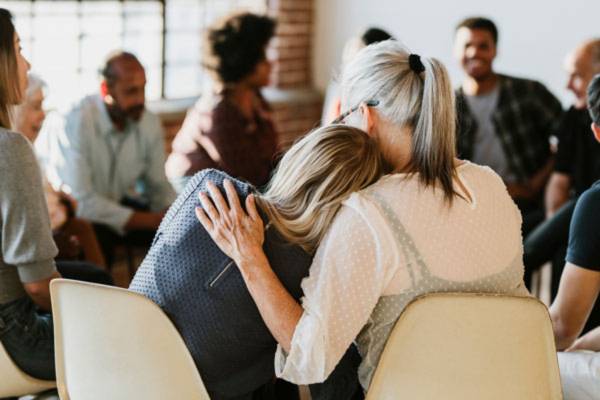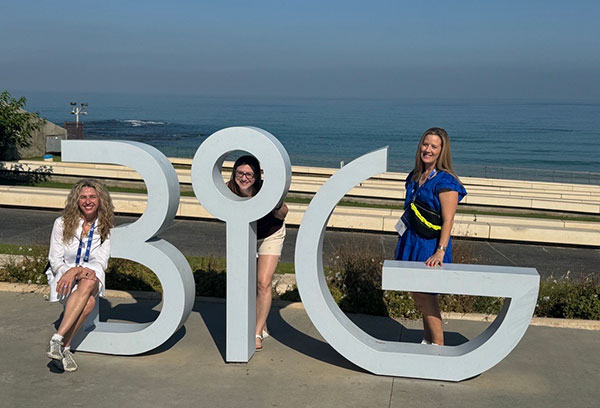
The Power of Groups: How Support Groups Foster Resilience in Mental Health
People support each other in group therapy. Credit: Adobe Stock/Rawpixel.com
By Amanda Mills
In a society where individuals often feel busy, isolated, and overwhelmed, it can be hard for them to find the time to prioritize their mental health or connect with others experiencing similar trials and tribulations. It can be intimidating for individuals to know what to say or who to share it with. However, through a support or therapy group, individuals can accomplish these goals in a safe environment.
There are many types of groups. Some focus on enhancing knowledge and skills. Others are peer-led and focus on sharing experiences and encouragement. In process groups, members focus on their own internal experiences, and the therapist provides a space to explore thoughts and feelings within the group context. Then some groups use specific models of therapy such as CBT, DBT, or art therapy.
Depending on individual needs and preferences, different groups offer unique benefits and opportunities for growth. Below are just a few of the advantages of participating in a group.
Validation and Understanding
One of the most significant benefits of support groups is the support and empathy individuals receive from fellow group members. Groups help them know that they’re not alone by connecting them with others with similar experiences. They help individuals tap into their common humanity, fostering a sense of camaraderie and care.
Reflection and Reframing
Participating in a group allows individuals to see their issues from other perspectives. Sometimes, this helps them have more compassion towards themselves. Other times, it challenges them or clarifies something they have been struggling with. When individuals can’t see the forest for the trees, sharing their experiences with others can be incredibly helpful.
Knowledge and Skills
Support or therapy group sessions often incorporate educational components where participants learn about mental health, relationships, or stress management. Many groups also incorporate a skill-building element, where participants get to practice their coping strategies. These skills empower individuals to navigate their lives more successfully.
Emotional Regulation
Groups provide a confidential and nonjudgmental environment within which individuals can process their feelings. Human beings are inherently social creatures and they feed off the energy of those around them. Regulating emotions, from fear to anger to sadness to excitement, is interpersonal. The whole body benefits from having others nearby that can connect with and support individuals.
Learning in Relationship
Support groups foster a sense of community where members expect one another to communicate honestly and authentically, to offer feedback, and to provide accountability. This relationship with fellow group members allows individuals to become more aware of their interpersonal dynamics and to practice their relationship skills in real-time in a way that’s not always possible in individual therapy.
It’s clear that groups are an important resource for many, but what should individuals expect when they join a group? Jewish Family Service groups are facilitated by one or more trained staff, usually mental health professionals, and are attended by three or more group members. Typically, groups meet for an hour or two on a weekly or monthly basis. Groups can be virtual or in-person, and each format has its pros and cons. Some people attend individual therapy in addition to groups, while others only participate in groups.
Most groups are designed to target a specific life experience, challenge, or goal such as grieving, anxiety management, parenting support, or mindfulness. Other groups focus more generally on processing emotions or building social skills. Some groups are time-limited and run for six or eight weeks, while others are ongoing and people can join on a rolling basis.
Whether individuals are seeking validation and emotional support, coping skills, or a sense of connection and belonging, it’s hoped they will consider a group as part of their support system. By embracing the power of the group, individuals can access new levels of transformation, healing, and resilience.
Jewish Family Service offers a variety of groups such as Mood & Mindfulness, Powerful Tools for Caregivers, SPACE – 6 Sessions to Empower Parents to Ease Child Anxiety, and many others. Check out our website for further information or email us directly at jfs@shalomaustin.org.
Latest Posts

Challenges and Resilience: Building Up and Protecting Jewish Communities. Austin Community Leaders Travel to Germany and Israel for Leadership Mission
L-R: Jennifer Failla, Shana Creeger, Frances Meltzer at the Peres Center for Peace and Innovation. Courtesy: Shana Creeger “My most recent mission trip to Berlin and Israel left me with such pride and hope for all the hard work being done to build and protect our...

Remembering Rabbi Monty Eliasov
JRabbi Monty Eliasov z”l. Courtesy: Barbara Taft By Abraham Davidson Rabbi Arnold Montgomery Eliasov ( z”l), affectionately known as “Rabbi Monty,” passed away peacefully on Shabbat, July 20, 2024, after a sudden illness. In his final hours, he was surrounded by...

Local Jewish Summer Camp Gives a Big Texas Welcome to Israeli Campers
Campers2gether campers creating a bunk tallit for Shabbat t’filah blessings. Courtesy: URJ Greene Family Camp By Allison Teegardin In July, 26 Israeli teenagers who were displaced when their community Kibbutz Zikim was attacked on October 7, were welcomed to URJ...




HEALTH & WELLNESS
Fitness
Swimming
Tennis & Pickleball
Sports
EDUCATION
Jewish Culture & Education
Early Childhood Program Preschool
After School & Childcare
Camps
ARTS & CULTURE
Literary Arts
Visual Arts
Theatre & Film
Dance
COUNSELING & SUPPORT
Jewish Family Service
Counseling & Groups
Case Management
References & Resources
Copyright Shalom Austin 2025. Privacy Policy.
